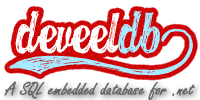23 namespace Deveel.Data.Types {
43 throw new NotImplementedException();
47 throw new NotImplementedException();
51 throw new NotImplementedException();
55 return GetUserType(objName);
59 throw new NotImplementedException();
63 throw new NotImplementedException();
67 throw new NotImplementedException();
72 if (fullTypeName == null)
75 return GetUserType(fullTypeName);
79 throw new NotImplementedException();
bool AlterObject(IObjectInfo objInfo)
Modifies an existing object managed, identified by IObjectInfo.FullName component of the given specif...
SqlType ResolveType(TypeResolveContext context)
bool DropObject(ObjectName objName)
Deletes a database object handled by this manager from the system.
The system implementation of a transaction model that handles isolated operations within a database c...
bool RealObjectExists(ObjectName objName)
Checks if an object really exists in the system.
Represents a database object, such as a table, a trigger, a type or a column.
ObjectName ResolveName(ObjectName objName, bool ignoreCase)
Normalizes the input object name using the case sensitivity specified.
Describes the name of an object within a database.
TypeManager(ITransaction transaction)
UserType GetUserType(ObjectName typeName)
void CreateObject(IObjectInfo objInfo)
Create a new object of the ObjectType given the specifications given.
Defines the properties of a specific SQL Type and handles the values compatible.
DbObjectType ObjectType
Gets the type of objects managed by this instance.
IDbObject GetObject(ObjectName objName)
Gets a database object managed by this manager.
bool ObjectExists(ObjectName objName)
Checks if an object identified by the given name is managed by this instance.
Defines the contract for the business managers of database objects of a given type.
The simplest implementation of a transaction.
DbObjectType
The kind of objects that can be handled by a database system and its managers
void Create()
Initializes the manager into the underlying system.


 1.8.10
1.8.10